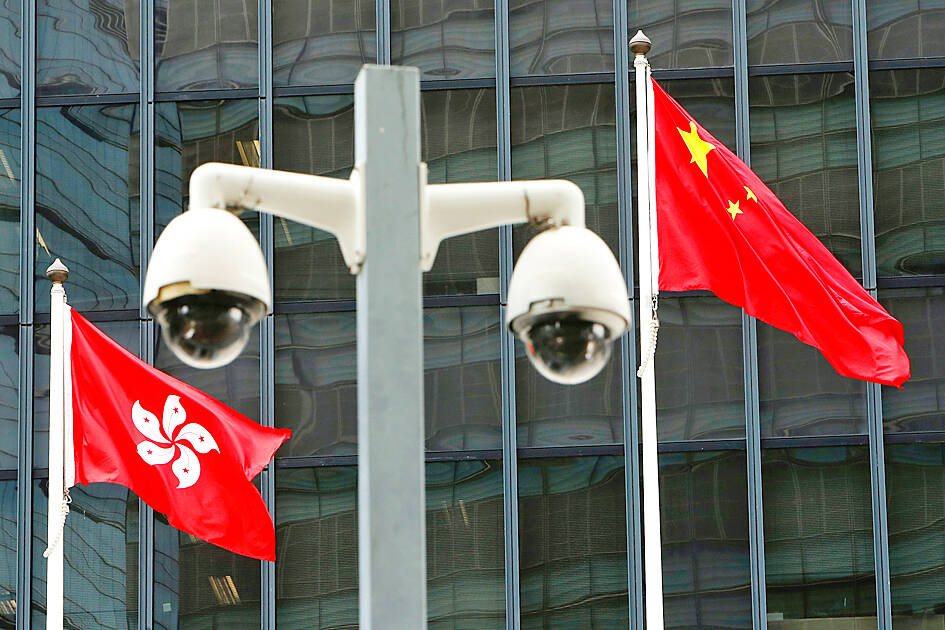Taiwanese could risk being extradited to China when traveling in countries with close ties to Beijing, Taiwan Association of University Professors deputy chairman Chen Li-fu (陳俐甫) said on Friday.
Chen’s comments came after China on Friday last week announced new judicial guidelines targeting Taiwanese independence advocates.
Myanmar, Cambodia, Laos and Djibouti are among the countries where Taiwanese could risk being extradited to China, he said.

Photo: Reuters
The Mainland Affairs Council (MAC) on Thursday elevated the travel alert for China, Hong Kong and Macau to “orange” after Beijing announced its guidelines to “severely punish Taiwanese independence diehards for splitting the country and inciting secession.”
Extradition treaties between China and about 60 countries have a provision to exclude the extradition for political offenses, MAC deputy head and spokesperson Liang Wen-chieh (梁文傑) said.
“Extraditable offenses are the ones that are punishable under the laws of both parties,” in accordance with UN Model Treaty on Extradition, he said.
Most developed countries would not extradite Taiwanese to China for the “splitting the country” offense, he said.
It is best not to travel to developing countries that have signed up for China’s Belt and Road Initiative, especially authoritarian nations with a record of punishing political offenders, such as Myanmar, Cambodia, Laos and Djibouti, Chen said.
Democracies upholding human rights are safe even if they have an extradition treaty with China, he said.
Vessels and aircraft constitute “moving territories” according to international law, he said, adding that the Chinese government could arrest Taiwanese on a Chinese plane or ship.
Taiwanese could also be arrested if they have a connecting flight at a Chinese airport, even though their destination is not China, Hong Kong or Macau, Chen said.
While Beijing has a history of arresting Taiwanese within its territories on the pretense of unpaid debt, tax evasion or sexual harassment, its latest guidelines are aimed at Taiwan independence activists, he added.

US climber Alex Honnold is to attempt to scale Taipei 101 without a rope and harness in a live Netflix special on Jan. 24, the streaming platform announced on Wednesday. Accounting for the time difference, the two-hour broadcast of Honnold’s climb, called Skyscraper Live, is to air on Jan. 23 in the US, Netflix said in a statement. Honnold, 40, was the first person ever to free solo climb the 900m El Capitan rock formation in Yosemite National Park — a feat that was recorded and later made into the 2018 documentary film Free Solo. Netflix previewed Skyscraper Live in October, after videos

NUMBERS IMBALANCE: More than 4 million Taiwanese have visited China this year, while only about half a million Chinese have visited here Beijing has yet to respond to Taiwan’s requests for negotiation over matters related to the recovery of cross-strait tourism, the Tourism Administration said yesterday. Taiwan’s tourism authority issued the statement after Chinese-language daily the China Times reported yesterday that the government’s policy of banning group tours to China does not stop Taiwanese from visiting the country. As of October, more than 4.2 million had traveled to China this year, exceeding last year. Beijing estimated the number of Taiwanese tourists in China could reach 4.5 million this year. By contrast, only 500,000 Chinese tourists are expected in Taiwan, the report said. The report

Temperatures are forecast to drop steadily as a continental cold air mass moves across Taiwan, with some areas also likely to see heavy rainfall, the Central Weather Administration (CWA) said. From today through early tomorrow, a cold air mass would keep temperatures low across central and northern Taiwan, and the eastern half of Taiwan proper, with isolated brief showers forecast along Keelung’s north coast, Taipei and New Taipei City’s mountainous areas and eastern Taiwan, it said. Lows of 11°C to 15°C are forecast in central and northern Taiwan, Yilan County, and the outlying Kinmen and Lienchiang (Matsu) counties, and 14°C to 17°C

STEERING FAILURE: The first boat of its class is experiencing teething issues as it readies for acceptance by the navy, according to a recent story about rudder failure The Hai Kun (海鯤), the nation’s first locally built submarine, allegedly suffered a total failure of stern hydraulic systems during the second round of sea acceptance trials on June 26, and sailors were forced to manually operate the X-rudder to turn the submarine and return to port, news Web site Mirror Daily reported yesterday. The report said that tugboats following the Hai Kun assisted the submarine in avoiding collisions with other ships due to the X-rudder malfunctioning. At the time of the report, the submarine had completed its trials and was scheduled to begin diving and surfacing tests in shallow areas. The X-rudder,